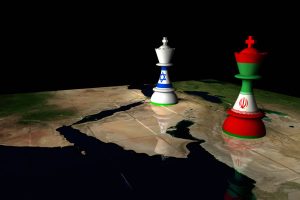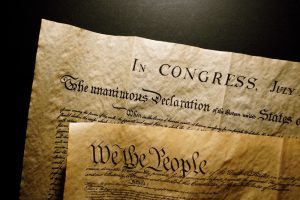The European Commission has published a document outlining five scenarios for how the European Union could evolve within the next ten years.
The so-called White Paper on the Future of Europe, which will be presented at the Rome Summit on March 25, 2017 to mark the 60th anniversary of the European Union, is intended to be “the starting point for a wider public debate on the future of our continent.”
Each of the five scenarios is based on the premise that “the 27 Member States move forward together as a Union.” The document does not consider the possibility that the EU could collapse or break apart, or even that the powers of the EU be significantly curtailed. The document states:
“Too often, the discussion on Europe’s future has been boiled down to a binary choice between more or less Europe. That approach is misleading and simplistic. The possibilities covered here range from the status quo, to a change of scope and priorities, to a partial or collective leap forward.”
Nevertheless, for the European Commission, the powerful administrative arm of the European Union, publicly to even consider alternatives to full-blown European federalism is a testament to the growing power and influence of anti-EU political movements in Europe.

A “family photo” of the European Commission, headed by Commission President Jean-Claude Juncker, in 2014. (Image source: European Parliament) |
Indeed, a document such as this would have been unthinkable before Brexit — an abbreviation for “British exit,” which refers to the June 23, 2016, referendum by which British citizens voted to exit the European Union — and the rise of anti-EU populist parties in Austria, Britain, France, Germany and the Netherlands, among others. The document admits:
“Europe’s challenges show no sign of abating. Our economy is recovering from the global financial crisis but this is still not felt evenly enough. Parts of our neighborhood are destabilized, resulting in the largest refugee crisis since the Second World War. Terrorist attacks have struck at the heart of our cities. New global powers are emerging as old ones face new realities. And last year, one of our Member States voted to leave the Union.”
The five scenarios for the EU by 2025 are: 1) carrying on; 2) nothing but the single market; 3) those who want more do more; 4) doing less more efficiently; and, 5) doing much more together.
Scenario 1: Carrying On.
This scenario envisions the status quo, with the EU plodding ahead with “incremental progress” from crisis to crisis. The document explains:
“Priorities are regularly updated, problems are tackled as they arise and new legislation is rolled out accordingly. The speed of decision-making depends on overcoming differences of views in order to deliver on collective long-term priorities.”
Scenario 2: Nothing but the Single Market.
This scenario envisions a European Union re-focused on the single market, which refers to the free movement of goods, services, capital and people within the bloc:
“In a scenario where the EU27 cannot agree to do more in many policy areas, it increasingly focuses on deepening certain key aspects of the single market. There is no shared resolve to work more together in areas such as migration, security or defense. The functioning of the single market becomes the main ‘raison d’être’ of the EU27.”
Scenario 3: Those Who Want to do More.
This scenario envisions a so-called multi-speed Europe in which some member states proceed with integration in certain areas while other member states do not:
“In a scenario where the EU27 proceeds as today but where certain Member States want to do more in common, one or several ‘coalitions of the willing’ emerge to work together in specific policy areas. These may cover policies such as defense, internal security, taxation or social matters.”
Scenario 4: Doing Less More Efficiently.
This scenario envisions the EU placing greater emphasis on some policy areas, while reducing its focus on others:
“The EU27 decides to focus its attention and limited resources on a reduced number of areas…. As a result, the EU27 is able to act much quicker and more decisively in its chosen priority areas…. Elsewhere, the EU27 stops acting or does less…. The EU’s weight in the world changes in line with its recalibrated responsibilities.”
Scenario 5: Doing Much More Together
This scenario is the European Commission’s preferred option: European federalism:
“In a scenario where there is consensus that neither the EU27 as it is, nor European countries on their own, are well-equipped enough to face the challenges of the day, Member States decide to share more power, resources and decision-making across the board.
“As a result, cooperation between all Member States goes further than ever before in all domains…. Decisions are agreed faster at European level and are rapidly enforced.
“On the international scene, Europe speaks and acts as one in trade and is represented by one seat in most international fora. The European Parliament has the final say on international trade agreements. Defence and security are prioritized. In full complementarity with NATO, a European Defence Union is created. Cooperation in security matters is routine.”
The document also offers a glimpse into what European federalism may look like in practice:
“Citizens travelling abroad receive consular protection and assistance from EU embassies, which in some parts of the world have replaced national ones. Non-EU citizens wishing to travel to Europe can process visa applications through the same network.”
The European Commission, in a rare instance of candor, admits that European federalism risks “alienating parts of society which feel that the EU lacks legitimacy or has taken too much power away from national authorities.”
The document does not, however, contemplate a scenario in which the European Union faces collapse, or in which major member states decide to follow the British example and exit the bloc.
In France and the Netherlands — two of the EU’s original six founding members — anti-EU presidential candidates are leading in the polls. Marine Le Pen and Geert Wilders have both promised to call referenda on continued EU membership. If one or both of those countries were to leave the EU, this at a time when Italy and Greece are at a fiscal breaking point, a collapse of the bloc seems increasingly possible.
The European Commission says its White Paper marks “the beginning of a process for the EU27 to decide together on the future of their Union.” The Commission does not, however, consider the possibility that in 2025 it may not even exist.







































